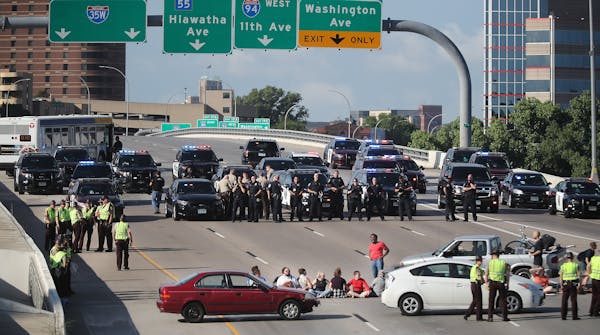The seminar was called "The Bulletproof Warrior," and the instructors urged the law enforcement officers in the hotel conference room to make the decision to shoot if they ever feel their lives are threatened.
Videos of bloody shootouts between police and civilians emphasized a key point: Hesitation can kill you.
In the audience at the May 2014 seminar was a young St. Anthony police officer, Jeronimo Yanez, city records show. He's now known around the world as the officer who killed Philando Castile minutes after making a traffic stop in Falcon Heights last week.
Amid intensifying demands for changes in police training in the wake of the shooting deaths of Castile and others, such "survival" courses for officers are flourishing nationally. But some in law enforcement are distancing themselves from the approach.
The Houston Police Department, for example, won't pay for its officers to attend the Bulletproof Warrior seminar, which is put on by an Illinois for-profit company called Calibre Press.
And the leader of an international police training association said he thinks some seminars like those offered by Calibre and other firms foster a sense of paranoia among officers.
"Police training became very militaristic and it caused a lot of the problems that are going on in the nation," said Michael Becar, executive director of the International Association of Directors of Law Enforcement Standards and Training, with offices in Idaho and Washington, D.C.
Calibre recently changed the name of its Bulletproof Warrior course after complaints from police departments about the implication of the word "warrior."
But owners of the company accuse the media of routinely distorting its message, twisting it to say the company's programs train officers to kill.
"Our mission is to save everyone's lives," said Calibre CEO Lisa Gitchell. "We go to bed every night knowing that we did the right thing. We train officers to treat people with dignity and respect."
Jim Glennon, a co-owner of Calibre who co-taught the seminar Yanez attended, said it's wrong to link the course to the officer's actions last week. "Everybody's going after this kid," Glennon said Wednesday. "Nobody should be judging what he did yet without the evidence."
The Bulletproof Warrior is one of 15 sessions offered by Calibre and its parent company, LifeLine Training. The courses are well-known and popular in law enforcement circles. Facebook photos show conference rooms and auditoriums filled with officers to hear the Bulletproof Warrior message.
Fans say it provides a valuable "wake-up call" in police safety tactics for the street: how to read the body language of someone preparing to attack, for instance. Training professionals note that Calibre was a pioneer decades ago in teaching basic police safety.
Yanez took the 20-hour seminar on May 21-22, 2014, according to a summary of Yanez's training that the city of St. Anthony provided after a public records request. A year earlier he attended "Street Survival," another of the company's seminars, records show.
Yanez also took 20 hours of training in 2012 in "Officer Survival" from a different organization. In May of this year, he took two hours of training titled "de-escalation," the only instruction in his four years with the department that appears to focus on that approach, the records show.
Yanez's lawyer, Thomas Kelly, did not respond to messages this week seeking comment. He told the Star Tribune on Sunday that the officer used deadly force because of "the presence of a gun."
The Bulletproof Warrior was hosted by the St. Paul Police Department, which coordinates a range of training for officers around the state through its Professional Development Institute website.
"We offer an array of courses to officers so that they can continue to develop professionally, learn new skills and view issues from different points of view," St. Paul police spokesman Steve Linders said.
William Czech was also in the Bulletproof Warrior class in the Ramada in Bloomington those two days in 2014. Czech isn't a police officer. He's a 47-year-old electrician from Mendota Heights with a keen interest in police training because of incidents involving a mentally ill family member.
Czech posed as a student to get into the class. He said he was horrified. He said he expected to see a presentation about understanding both how to avoid using deadly force as well as how to realize when it's unavoidable. Czech said the course consistently emphasized the risk of hesitation.
A copy of the seminar booklet that he made shows a page titled "Thou Shalt Not Kill?" It cites Bible verses that emphasize prohibitions on murder, not all killing.
On the second day, the group watched the shootout videos. One is the particularly gruesome dashcam video of Andrew Brannan pulling over in his white truck in Georgia in 1998 and then shooting Deputy Kyle Dinkheller to death.
Czech said Glennon ran that part of the seminar.
"Every time a video came up where the officer hesitated, he would stop and he would say 'This is a point where there should have been a reaction, he should have engaged,' " Czech said.
Glennon, who was in St. Paul Wednesday running a leadership seminar, said in an interview that he is aware that a man in Minnesota posed as a student to get into the seminar. He called Czech's interpretation of the seminar "totally inaccurate."
"That's why we don't let the press in," Glennon said.
Glennon said they discussed how "hesitation can get you killed." But the gist of the seminar is about balance and communication, he said, and how officers have to shift rapidly from guardian mode to warrior mode when situations turn violent.
The Bible verses are part of a discussion about officers dealing with guilt following a shooting, he said.
Glennon said the company renamed the course "Interaction and Influence" about three or four months ago. "We had different calls from some agencies literally saying the word 'warrior' has such a bad connotation we're not comfortable sending people there," he said.
But Glennon called assertions that its seminars promote an overly aggressive mind-set "ludicrous." If officers trained more with their weapons in stressful scenarios, they would be more confident and less likely to fire, he said.
Still, there are some in law enforcement training who question the courses.
Becar, who leads the international law enforcement training group, said his organization has no position on LifeLine Training and Calibre. But he said he has attended Calibre classes.
"Everything they were doing made the police officers very paranoid," Becar said. "At some point they wouldn't even stop a car without three backups."
The Houston Police Department will not pay for officers to attend the Bulletproof Warrior seminar, said Houston police spokesman Kese Smith. Officers can go on their own time and expense, he said.
Smith said he couldn't elaborate, saying only that "some of their instruction is not what we instruct."
Peter Kraska, chairman of the School of Justice Studies at Eastern Kentucky University, called the company's seminars "irresponsible" and "dangerous." Kraska's research focuses on the militarization of U.S. law enforcement, which he traces to the war on drugs.
To Kraska, the training is an unexplored factor in the deadly confrontations taking place across the United States between police and civilians.
"It's a huge missing explanatory part of what's going on," Kraska said.
Jennifer Bjorhus • 612-673-4683
New Minnesota GOP leaders seek peace with party's anti-establishment wing

Who is Republican Lisa Demuth, Minnesota's first House speaker of color?

Minnesota House GOP, Secretary of State Steve Simon return to Supreme Court
Supreme Court sides with DFL and Simon, says 68 House members needed for floor action

